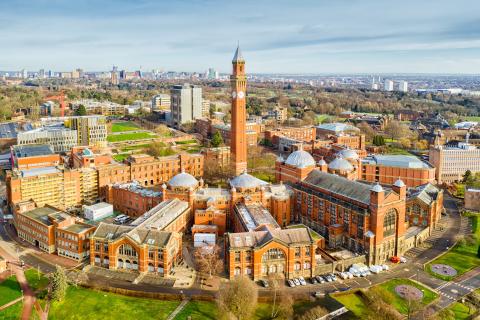University of Birmingham
Institute

School of Physics and Astronomy,
University of Birmingham,
Edgbaston,
B15 2TT,
Birmingham,
UK
+44 (0)121 414 8684

School of Physics and Astronomy,
University of Birmingham,
Edgbaston,
B15 2TT,
Birmingham,
UK
+44 (0)121 414 8684
The School of Physics & Astronomy at the University of Birmingham is one of the largest physics departments in the UK with a high profile for research both in the UK and internationally. The School covers a wide range research portfolio in five principal themes: Particle Physics, Nuclear Physics, Quantum Matter, Nanoscale Science and Astronomy. The School's performance in the Research Excellence Framework (REF) has highlighted that 90% of research outputs in the School were rated as world-leading or internationally excellent.
The University of Birmingham has been awarded a Gold rating in the 2016/17 Teaching Excellence Framework (TEF), reinforcing its global reputation as an outstanding higher education provider.
We have consistently performed very well in the National Student Survey and our courses have been reviewed by the Quality Assurance Agency and have been adjudged Excellent. Our student satisfaction rating of 93% in 2017 demonstrates the quality of our teaching.
The School is very active in outreach and public engagement, offering a series of workshops and masterclasses to students of all ages, from the primary school years all the way up to A- levels. Our students actively participate in the outreach events, thus becoming ambassadors for the subject they study.
Particle physics is one of the largest areas of research within the School, studying collisions produced by particle accelerators to determine the ultimate structure of matter and the forces of nature. Our current activities are based at CERN in Geneva.
We have a central involvement in the ATLAS experiment at the Large Hadron Collider, where we are studying the Higgs boson and searching for other signs of new physics at the energy frontier. We are also involved in investigating the matter-antimatter asymmetry in the Universe using beauty quarks at the LHCb experiment. Our NA62 group is studying ultra-rare decays of strange particles to search for new physics such as lepton flavour violation.
Our nuclear physics group is involved in related research with the ALICE experiment, using the world's most powerful particle accelerators to study nuclear matter at extreme temperatures and pressures, mimicking the conditions of the early universe, making and characterising quark-gluon plasmas; a perfect liquid of 'free' quarks and gluons.
Our research is supported primarily by the Science and Technology Facilities Council (STFC) with additional current grants from the Royal Society, the European Union's Horizon 2020 research and innovation programme, and the European Research Council.
We offer BSc (3 year) and MSci (4 year) Institute of Physics accredited courses in Physics, with many options and related projects available in later years, taught by internationally recognised experts.
We very much value our contacts with teachers and students in schools and colleges and are continually developing links, activities and resources which we hope will enrich the school curriculum and support Physics Education.
We organise activities for students and teachers visiting the University and also take activities out into schools and colleges. At a variety of levels, we aim to give insights into current research, explain degree and career options and generally enthuse the next generation to study more Physics!
See our outreach webpages for further information.
The Particle Physics Masterclass is one of our main annual events and has been running successfully for more than ten years. Around 100-150 students, just completing their first year of A Level studies in schools in the Midlands and further afield, attend this event every year.
The Masterclass comprises talks by research staff and postgraduate students; hands-on computing activity investigating particle interactions from ATLAS; demonstrations of particle detectors (e.g. cloud and spark chambers and a scintillator telescope) and Q&A sessions in small groups. The culmination of the day is a live video linkup with Birmingham physicists and their ATLAS colleagues in the experimental control room at CERN. Students hear the latest news from CERN and are able to pose their questions to the experts.

